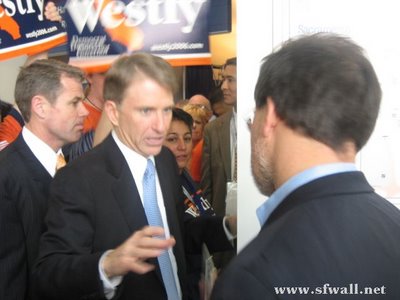 Left: State Controller Steve Westly: Can he save California Democrats? He'd Better.
Left: State Controller Steve Westly: Can he save California Democrats? He'd Better. Californians, and San Franciscans especially, have some momentous choices to make in what should be a minor off year primary. Two of the most interesting races exemplify some of the best and worst new trends in state politics - both involve independently wealthy candidates at least on one side, both have devolved into negative campaigning, both involve at least one side justifying itself on the facile of premises, and both reflect the divide - one not so much of ideology as much as posture.
Part One: Westly vs. Angelides
With Arnold Schwarzenegger facing no opposition within his own party, attention has turned to the Democratic Primary between State Treasurer Phil Angelides and State Controller Steve Westly, two candidates who appear to have as much in common as they do issues that divide them.
Both are relatively wealthy and significantly self-financed, although Westly more so. Before being elected as State Controller in 2002 against Republican Tom McClintock (and outspending him by 5-to-1), Westly was known primarily as a plank holder in the now gargantuan money tree known as eBay. Before that he was one of the first directors of Netcom Communications, one of the first consumer Internet service providers. What may not be so well known is that his successful private sector career was jump-started by a stint in government: after serving as an aide to the late Congressman Leo Ryan, Westly went to work for the Carter Administration on energy policy and then for the state PUC.
The Westly resume is noteworthy here because he has worked on both sides of the regulatory system for two industries of major import to Californians: energy and telecom. One industry saps at California's economic growth (and, it could be argued, is responsible for the undoing of the last Democratic administration here and for economically hobbling most consumers here at the same time); the other represents its future growth. It is a highly prescient combination of experience for a post-Schwarzenegger governmental landscape characterized by Legislative Capture (you will hear this phrase again, and again) by regulated service industries.
Angelides, on the other hand, made his fortune along a similar track, but in a more obvious choice of industry for getting rich: real estate. After working for the state redevelopment agency for almost a decade, he also went private, working for the Sacramento area developer Angelos Tsakopoulos, and later founding his own development firm.
 Left: Angelides bought a lot of signs - and bagged the state party endorsement.
Left: Angelides bought a lot of signs - and bagged the state party endorsement.Both AKT Development Corporation (Tsakopoulos' firm) and River West (Angelides' firm) have made a significant mark on the economic landscape of Sacramento and the surrounding river delta area. The region exploded during the 1990's, turning what was once considered part of rural California into a major suburban zone - which hit the wall in the wake of the 2000 Crash. Laguna West, a River West development in Elk Grove, may well exemplify the future of suburban development in the area. Widely touted as an example of 'Smart Growth," some experts contend it's anything but.
Both have served as part of the state party leadership. Throughout the 80's as a young professional, Westly maintained a concurrent track in the state Democratic Party, serving in a number of fundraising positions and finally serving on the DNC from 1988 until 2004. Angelides also served a number of roles within the state party, eventually elected as party chair - a seat Westly tried for once and lost, to Jerry Brown - in 1991.
A casual onlooker might regard these two candidates as identical. But in many ways, they are different enough that whomever one wins in the June primary will dictate the future direction of the democratic party in California - regardless of whether or not the nominee eventually beats Arnold in November.
Westly’s primary message is one of reform and pragmatism - of turning the state’s democrats away from the insider politics and entitlement-oriented policies which have weakened the Democratic base in the state and made the Total Recall possible in the first place. Angelides has on the other hand touting himself as the "real" Democrat, lampooning Westly's wealth as if he were Al Checchi, succoring the civil service unions and keeping the hospitality suites at the conventions well stocked. Given the insular nature of party politics, it's probably not surprising that Angelides won the party endorsement, but can he win the primary? And if he does, can he beat Arnold?
Westly's campaign gained a significant amount of ground early in the campaign before most voters even knew who he or Phil Angelides was, leading him by double-digits. Most of the newspapers and a lion's share of legislators have endorsed him. The party elite and highest-profile electeds have gone to Angelides along with the state party endorsement, and polls now put either candidates' chances at dead even. Concurrent with the endorsement have been increasingly heated public appearances, which have devolved into negative campaign ads, which seem to be on every commercial break during the major newscasts now.
California Democrats face a heady choice in the June primary, between a smart, independent and reform-minded candidate with the necessary experience to navigate the new deeper waters of state government and a party player who promises more of the same. In making that choice, it may be necessary for them to think beyond the increasingly shallow notions of party loyalty and think about the high seas facing our state in the future. And about sinking Arnold before he gives the Ship's Store away.
Next: The 12th Assembly District Race

No comments:
Post a Comment